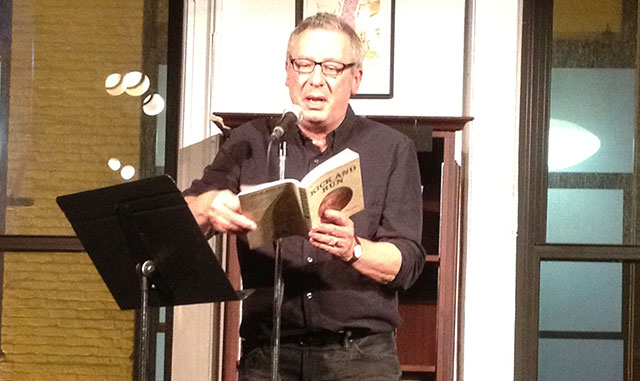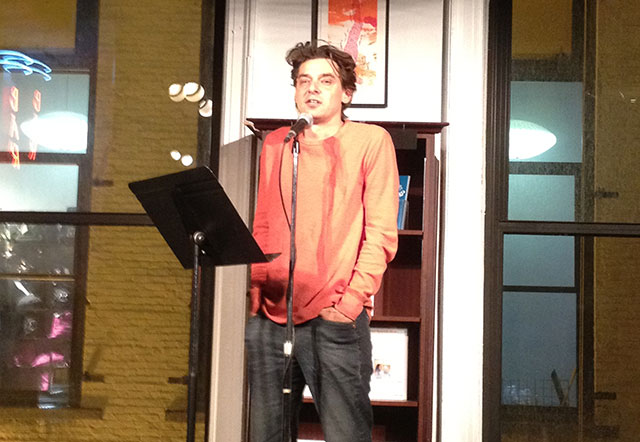
France and Portugal advanced to the World Cup last night in solid victories. But on this side of the Atlantic, novelist Jonathan Wilson was reading from Kick and Run, his new memoir tracing the importance of soccer throughout his life. He was at Housing Works Bookstore, joined by Rosie Schapp, author of Drinking with Men (2013) and Péter Zilahy, author of The Last Window-Giraffe (2008).
Wilson grew up in England before emigrating at the age of 26, and has been a lifelong fan of Tottenham Hotspurs, a Premiership team. He is the author of seven other books including the novels A Palestine Affair (2003) and The Hiding Room (1997) and the father of novelist Adam Wilson. He lives in Massachusetts.
Rosie Schapp is a cocktail reporter for the New York Times and essayist. Péter Zilahy is a Hungarian born writer who discusses the madness of growing up under a dictatorship in his memoir The Last Window-Giraffe.
.jpg)
Zilahy read first, choosing an essay about playing soccer at Pioneer Camp, what essentially amounted to a Hungarian version of the Boyscouts for the best soccer players. There, he said, players had access to the newest things like music and movies. Zilhay is obviously proud of the legacy of the Hungarian soccer tradition, claiming the nation was responsible for professionalising the sport by paying players. He also talks about how every Hungarian grows up watching the 1954 World Cup match between Hungary and West Berlin where underdog West Berlin defeats the Hungarian team.
Schapp followed with a section from her book on how she became a Tottenham Hotspurs fan. Schapp, an American, has spent a good deal of time in bars drinking–thus the title of her book–and there came across bar regulars who were also soccer fans. She was more or less recruited to Hotspurs fandom by a friend of hers, though she also favors the Dutch national team. Schapp found Spurs a good fit because she liked cheering for the underdog–Tottenham often ends the season in the middle of the rankings. She is also Jewish, and Tottenham has long been known as the Jewish Premiership team.
Then Jonathan Wilson steps to the microphone to read a passage from his memoir. The section he reads regards his time playing in an over-forty men’s league. While youth soccer requirements usually define a maximum age limit, adult leagues operate the opposite way requiring a minimum age to join the team. Over-forty leagues are not unlike the Snicker’s commercial feature Betty White and Abe Vigoda: older folks playing rough and tumble sports. Wilson’s story is about the last goal he scored in competitive soccer, in which he injures himself for the last time. He manages to be both hilarious and sincere at the same time.
When Wilson finishes, Schapp, and Zilahy join him on stage for a discussion. Wilson, who unlike Zilahy, very comfortably says the word soccer, jokes that he uses the word rather than “football” because its better for the American market. He also says that years of coaching his childrens’ soccer teams pressured him toward saying soccer over football.

Though all three writers presented memoirs, there are of course moments in memoir when memory and narrative structure can collide. There is always some bending of the truth, but also the faultiness of memory can cause a problem too. Schapp says she relies on confirming her stories with the other people who were there. Of course, she wrote a drinking memoir, so she adds, “you have to suspend disbelief… memory isn’t perfect.”
Zilahy says that the balance between creating a narrative and honesty is easy: he just writers the truth. “What is fiction anyway?” he asks.
Schapp and Wilson are both Spurs fans. Schapp came to the team later in life as her memoir explained. But for Wilson, growing up nearby, he remembers attending one of his first games. He describes the experience of his first trip to watch Spurs play as magic. And like Bottom waking up in Midsummer Night’s Dream, he awoke the morning after a fan. They had artful midfielders, he says, adding “we’re beautiful losers who were once winners.”
With the release of Kick and Run, Wilson was asked to put together a list of his favorte works of soccer literature. It was a tough list to write he said. People kept asking if he had read Nick Hornby’s Fever Pitch, and he says, for years he refused because it was about Arsenel (a Premiership rival of Tottenham). But then eventually he found the book in a store and began flipping through it and couldn’t stop reading it.
Later, Wilson found himself in a sports memorabilia store. He found a box of soccer player cards–cards he said that are virtually worthless, but that the store owner seemed to think were worth millions. In the box he found a few Arsenel cards from the 1970s and sent them to Hornby. Hornby apparently loved the cards and was surprised Wilson was giving them away, but Wilson says, “they were poisoning my collection.” Apparently, collectible soccer cards are a thing British men take seriously.
Tottenham Hotspur are known as the Jewish team, but nobody seems to know why. Fans are known as the Yid Army, and their chanting at the games has raised the ire of anti-racism advocates in the United Kingdom. Zilahy says every league has a team that has been declared a Jewish team, even Hungary has a Jewish team.
Wilson explains that while Spurs do have many Jewish fans and the neighborhood around the stadium tends to be a popular Jewish enclave, its a relative term; England doesn’t have very many Jews. He believes that in actuality, the association with Judaism stems from conflicts with Leeds fans. The Leeds fans, in a harsh bit of anti-semitism, began calling Spurs fans Yids, and to counteract it, Spurs fans co-opted it as their own. English soccer fans take the sport seriously.
The concerns of whether the chants or even the fan’s associations with judaism are a growing concern. Wilson says many Spurs fans would likely be racist skinheads in other circumstances. But its not the same as something like American-Football franchises like the Redskins; its the fans adopting something as their own rather than a corporate institution. Even PM David Cameron weighed in on the issue saying he didn’t believe it was hate speech. But Wilson adds, “then he [Cameron] said something in latin that no one understood because no one else went to Eton.”

Jonathan Wilson, Rosie Schaap and Peter Zilahy
Housing Works Bookstore Cafe
Tuesday, November 19, 2013